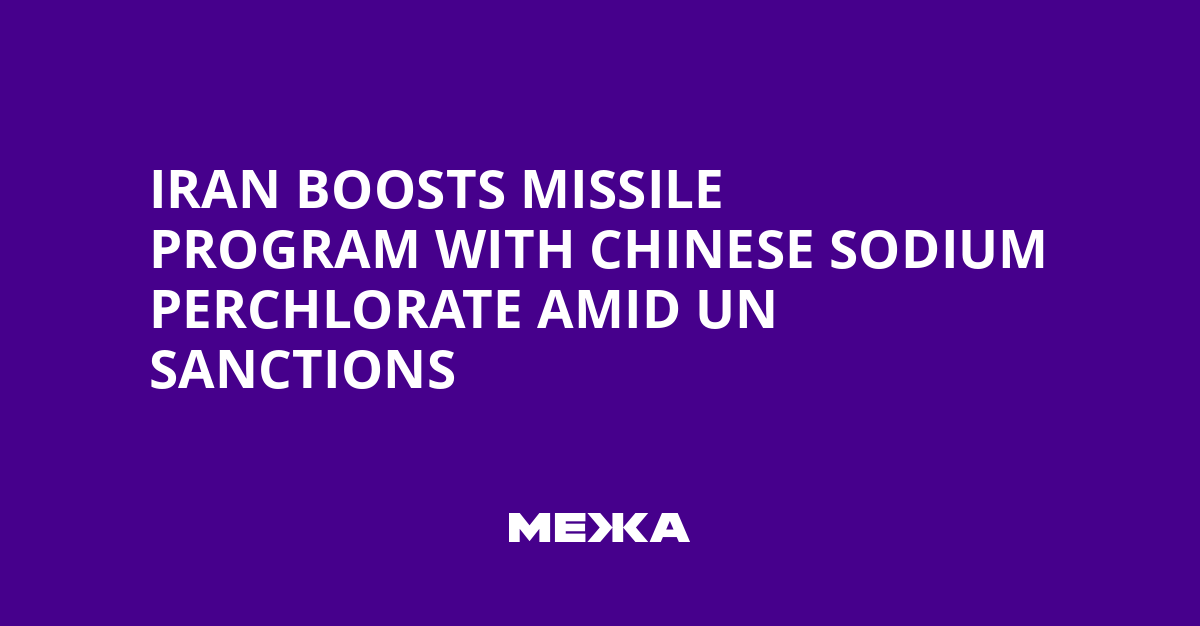Iran, it seems, is intensifying the revival of its missile program despite the UN resolutions reinstated last month that ban arms shipments and activities related to ballistic missiles.
According to European intelligence sources, several shipments of sodium perchlorate – a key precursor for the solid propellant powering Iran’s medium-range missile systems – arrived from China at Bandar Abbas port after the snapback mechanism signaled its effect at the end of September.
According to sources, shipments that arrived since September 29 total about 2,000 tons of sodium perchlorate, purchased by Iran from Chinese suppliers after the 12-day conflict with Israel in June. Such purchases are seen as part of a determined bid to replenish the Islamic Republic’s depleted missile stockpiles. Several ships and Chinese companies are currently subject to U.S. sanctions.
The shipments come amid the reinstatement of sanctions via the snapback mechanism – a provision that concerns Iran’s violation of the 2015 agreement (JCPOA) and monitoring of its nuclear program.
Under the new sanctions, Iran should not engage in any activity related to ballistic missiles capable of delivering nuclear weapons. United Nations members should also prevent providing Iran with materials that could aid the development of nuclear-weapon delivery systems, which experts refer to as potential ballistic missiles.
Countries should avoid providing Iran with assistance in weapon production. China, along with Russia, oppose the reimposition of sanctions, noting that it undermines efforts to resolve the Iranian nuclear issue through diplomacy.
Although sodium perchlorate itself is not explicitly listed in UN documents as a banned export to Iran, it is a direct precursor to ammonium perchlorate, used as a prohibited oxidizer in ballistic missiles. Experts worry about the absence of a clear ban that could leave room for interpretation by China.
CNN traces the route of several vessels intelligence labels as participants in the latest shipments of sodium perchlorate from Chinese ports to Iran, using ship-tracking data and crew reports on social media. Many of them regularly sailed between China and Iran.
Among the identified ships is MV Basht, which is already under U.S. sanctions: it departed Zhuhai port on September 15, arrived at Bandar Abbas on September 29, and later returned to China. Similarly Barzin travelled from Gaolan on October 2 and arrived at Bandar Abbas on October 16, after which it again sailed to China on October 21. Elyana left Changjiangkou on September 18 and arrived at Bandar Abbas on October 12. Finally MV Artavand left Liuheng and arrived at Bandar Abbas on October 12 with its AIS system turned off to conceal movements, according to Western intelligence.
It remains unclear whether the Chinese government is aware of the scale of the shipments. In response to CNN’s inquiry about operations, a spokesperson for the Chinese Foreign Ministry said he was “not familiar with the specifics,” but that China “consistently adheres to export controls on dual-use items in line with international obligations and domestic law.”
“We want to emphasize that China seeks to resolve the Iranian nuclear problem peacefully through political and diplomatic means and opposes sanctions and pressure,” the spokesman added, noting that the reimposition of sanctions via the snapback mechanism is “counterproductive” and a “serious step backward” in efforts to “resolve the Iranian nuclear problem.”
First of all, China – together with Russia and Iran – condemned the legality of using the snapback mechanism in a joint letter to the UN, published on October 18, which suggests Beijing is unlikely to consider itself bound to follow the renewed measures.
– Tong Zhao
Context and Expert Reactions
Analysts say that further shipments of sodium perchlorate point to a rise in Iran’s rearmament pace after the conflict with Israel touched the country’s missile systems.
“Beijing may be aware that such exports indirectly support Iran’s missile program,” Zhao said, “but it may also see this as a matter of principle – reaffirming China’s sovereign right to make independent decisions on export controls for items not explicitly prohibited by the UN.”
– Tong Zhao
CNN journalist Simona Makarti contributed to the report.
